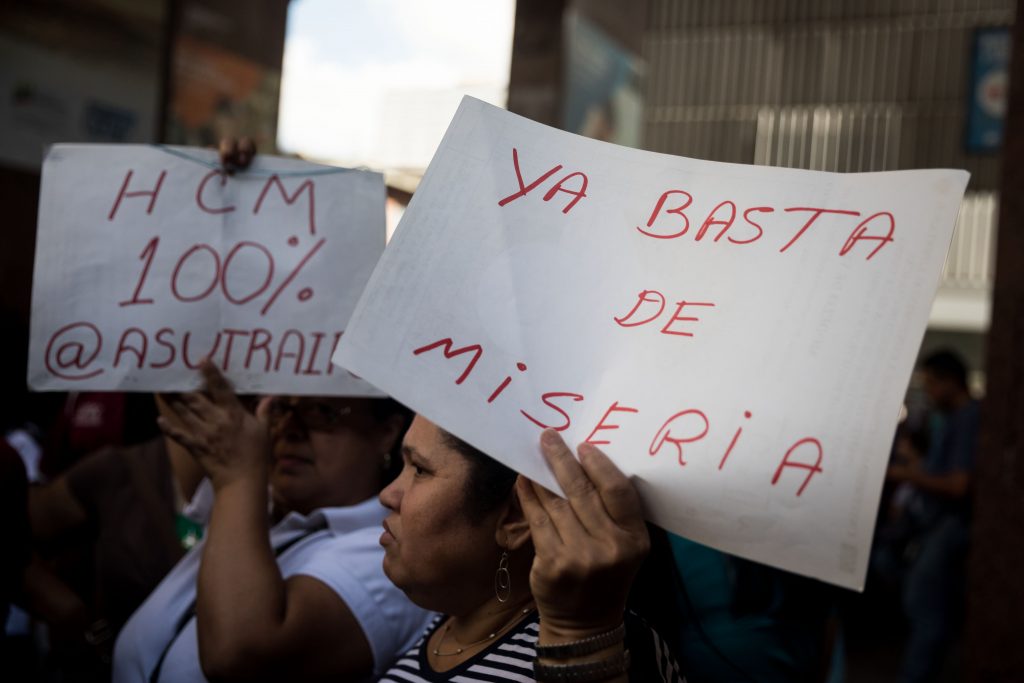Venezuela, the country with the lowest wages in the region and an unprecedented humanitarian crisis, has broken the record for the highest inflation in the Americas, to such an extent that by 2019 hyperinflation will reach the astounding figure of 10,000,000%. This is due, according to the Venezuelan economist José Toro Hardy, to “aberrant public policies” full of state controls.

Toro Hardy explained to the PanAm Post that with the IMF’s new estimate, Venezuela is among the worst inflation cases that humanity has known in its entire history:
“This is the result of aberrant public policies and unrestrained populism. The government of Venezuela has incurred an unmanageable fiscal deficit to finance the cash flow of PDVSA, which is the oil company of the market.
The Government has resorted to demanding from the Central Bank of Venezuela that it make immense issues of money without support; that money is incorporated into the country’s money supply and, consequently, demands goods. But since there are no goods to be had, because they have destroyed the productive apparatus through expropriations, price controls, through all kinds of socialist measures, what they have achieved is that there is a shortage of absolutely anything. In Venezuela there are no medicines, there is no food, but the result is that with this huge money supply demanding goods that do not exist, the only thing that is achieved is that prices go up,” he explained.
Given this situation, generated by Chavismo, 91% of Venezuelan families live below the poverty line, and 65% of them face extreme poverty.
“It is very difficult to live in these conditions, first because the country has become impoverished, because there is no salary that can withstand this increase in prices, and that adds to the scarcity of almost any product. People are getting desperate and living in terrible anguish and for that reason many Venezuelans simply choose to leave the country,” notes Hardy Toro.
Fondo Monetario Internacional.
Informe octubre.
Inflación (e) 2019.🇦🇷Argentina 20,2%
🇧🇴Bolivia 4,5%
🇧🇷Brasil 4,2%
🇨🇱Chile 3%
🇨🇴Colombia 3%
🇪🇨Ecuador 0,1%
🇵🇾Paraguay 4%
🇵🇪Perú 2%
🇺🇾Uruguay 6,5%
🇻🇪Venezuela 10.000.000%— Jesús Casique (@jesuscasique1) October 9, 2018
The economy in Venezuela resembles that of a country at war, with a shortage of food and medicines unique in its history. In addition, with a daily price variation that translates into the highest inflation in the region, the country now constitutes one of the worst ten significant hyperinflationary cases in the world.
According to the latest forecasts of the International Monetary Fund (IMF), Venezuela’s GDP will register a contraction of 18% this year, extending its fall to five straight years; while next year the recession could be 5% as a result of the collapse of oil production and political and social instability.
According to the IMF studies, Venezuelan hyperinflation will reach 1,370,000% annually in 2018, and will jump to 10,000,000% in 2019. The situation is so serious that Venezuela was excluded from the regional average and from the list of emerging markets so as not to distort the figures.
On the other hand, the IMF calculates that the per capita wealth of Venezuela has fallen “more than 35%” between 2013 and 2017, and predicts the loss of around 60% of GDP per capita between 2013 and 2023, a figure that would place the impoverishment expected for Venezuela at levels similar to that registered by countries at war like the cases of Iran between 1976 and 1981, Iraq between 1999 and 2003, Azerbaijan between 1990 and 1995 or Libya between 2010 and 2011.
A decade ago, when this situation was first noticed, many economists said that hyperinflation could never occur in Venezuela because of oil. However, thanks to socialism, it was possible to destroy not only the economy, but also the production of crude oil.
Before, the primary reason why Venezuelans emigrated was mainly due to the insecurity and the high levels of violence in the South American country; now the main reason is because Venezuela’s economy is so entirely unsustainable.













